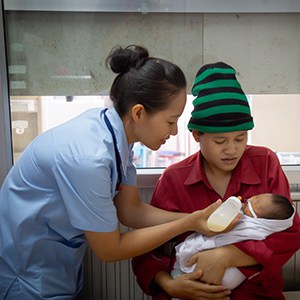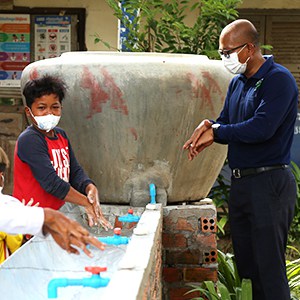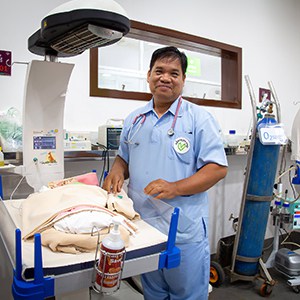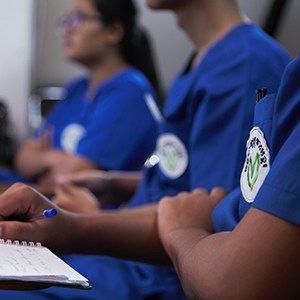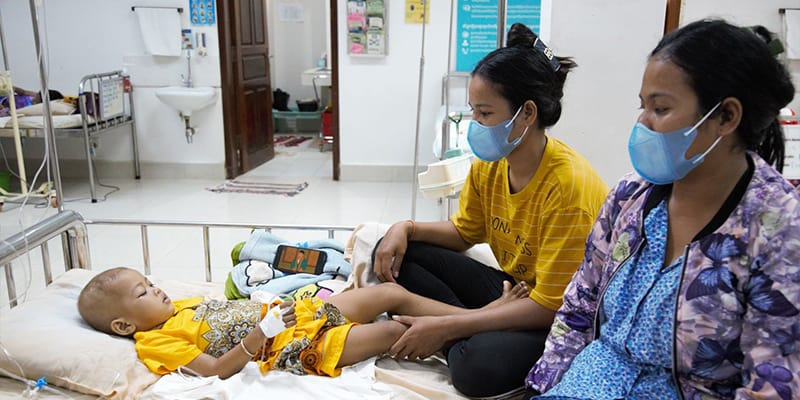AHC treats children from all 25 provinces in Cambodia, with many traveling hours at the best of times to receive the care they need. A sustained community transmission of COVID-19 in late February 2021 led Cambodia to a national outbreak. The national and local governments enacted numerous measures in an effort to curb the outbreak, including curfews and lockdowns; one measure affecting many AHC families was an interprovincial travel ban enacted on April 7, 2021. While travel for emergency medical purposes is allowed under the travel ban, the lack of public transportation has created additional barriers for families attempting to get treatment at AHC.
Since the outbreak, AHC has seen a noticeable drop in the number of patients arriving at AHC for treatment. This is especially concerning for Cambodia’s sickest children, particularly those in the Paediatric Intensive Care Unit and Oncology Unit. Read about Samnang and his family overcoming the challenges presented by the pandemic to receive the life-saving treatment they need during the lockdown, yet our doctors are concerned for many patients who have not been able to overcome the financial and logistical barriers to arriving at AHC at this time.
Four-year-old Samnang lives in Saang District, Kandal Province with his mother, Bopha, father, seven-year-old brother and 8-month-old sister. The family lives off of the father’s earnings as a farmer, however the COVID-19 pandemic has affected his income because there are fewer suppliers collecting the produce to be sold. In January 2021, Bopha noticed that her son’s eye was red and he stopped playing with other children, making it clear that he was unwell. Bopha took Samnang to the local clinic before being referred to a hospital in Phnom Penh. There, Samnang was diagnosed with retinoblastoma and referred to AHC since AHC’s doctors have the best capacity to treat such cases.
Retinoblastoma is a common childhood cancer affecting the eye and AHC’s specialised Eye Clinic and Oncology Unit worked together to first remove his eye and then follow-up with six rounds of chemotherapy to ensure the cancer does not return. After Samnang underwent surgery and his first cycle of chemotherapy, the national COIVD-19 situation escalated drastically.
One of AHC’s Oncology Doctors, Dr Vannak, explained that children receiving chemotherapy for retinoblastoma risk having their cancer return if they miss even one month of treatment. Understanding the importance for her son’s health, Bopha knew she had to do whatever she could to ensure that Samnang received his next round of life-saving chemotherapy. Having come to AHC the previous two times by bus, this option was no longer available during the lockdown due to government regulations. Having no other option, Bopha decided to make the 11 hour journey on the family’s moto, with her sister carrying 4-year-old Samnang on the back.
She said, “I had no choice but to ride the moto on my own, with no certainty that I could get through the lockdown check points. It was very difficult. There were many check points. I have to beg the police to let me through. My son stopped me many times because the journey with motor is hard, especially because of the rain and heat.” Because of the COVID-19 outbreak, the journey was especially difficult and Bopha explained that she was “even afraid to stop at the restaurants. I packed food enough for the journey so we would stop on the side of the road to eat.”
She explained that the most difficult part was when they reached Siem Reap Province because they both came from a “hot spot” area for COVID-19 and because Siem Reap had implemented its own lockdown. This meant they were required to take a COVID-19 test, wear a mask, take their temperature, and fill out paperwork before they were able to present at AHC. Dr Vannak explained that many of their patients have had to stay for one night in isolation with the local police while waiting for their COVID-19 test results if they came from Phnom Penh or another province with a high number of cases.
Unfortunately, Dr Vannak has spoken to nearly half a dozen other cancer patients by phone, typically from poorer areas, who are unable to secure transport during the lockdown. AHC is able to help families with the paperwork to cross the checkpoints, yet without public transportation available, travel is still a barrier for chemotherapy patients potentially putting them at risk of their cancer returning or other complications.
